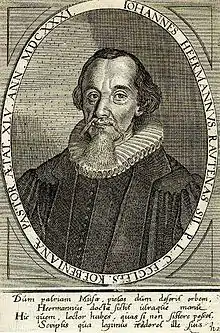Herzliebster Jesu
"Herzliebster Jesu" (often translated into English as "Ah, Holy Jesus", sometimes as "O Dearest Jesus") is a Lutheran Passion hymn in German, written in 1630 by Johann Heermann, in 15 stanzas of 4 lines, first published in Devoti Musica Cordis in Breslau.[1] As the original headline reveals, it is based on Augustine of Hippo; this means the seventh chapter of the so-called "Meditationes Divi Augustini", presently ascribed to John of Fécamp.[2]
| "Herzliebster Jesu" | |
|---|---|
| Lutheran Passion hymn | |
 Johann Heermann, the poet | |
| English | "O dearest Jesus" |
| Catalogue | Zahn 983 |
| Genre | Hymn |
| Written | 1630 |
| Text | by Johann Heermann |
| Language | German |
| Meter | 11.11.11.5 |
| Melody | by Johann Crüger |
| Published | 1630 |
Its tune, Zahn No. 983, was written ten years later by Johann Crüger and first appeared in Crüger's Neues vollkömmliches Gesangbuch Augsburgischer Confession.[1][3] The tune has been arranged many times, including settings by J.S. Bach: one of the Neumeister Chorales for organ, BWV 1093,[4] two movements of the St John Passion, and three of the St Matthew Passion.[1][5] Johannes Brahms used it for one of his Eleven Chorale Preludes for organ, Op. 122: No. 2.[6]). Max Reger's Passion, No. 4 from his organ pieces Sieben Stücke, Op. 145 (1915–1916), uses this melody. Mauricio Kagel quoted the hymn, paraphrased as "Herzliebster Johann, was hast du verbrochen", in his oratorio Sankt-Bach-Passion telling Bach's life, composed for the tricentenary of Bach's birth in 1985.
Translations
The most common[7] English translation of this hymn was written by Robert Bridges in 1897 and begins with the first line "Ah, holy Jesus, how has thou offended?"[8] However, several Lutheran hymnals use a translation written in 1863 by Catherine Winkworth which begins "O dearest Jesus, what law hast thou broken?"[9] An alternative translation in modern English from the Choral Niagara website[10] is also shown below for comparison.
| Original German | Bridges translation |
|---|---|
| Herzliebster Jesu, was hast du verbrochen, Daß man ein solch scharf Urteil hat gesprochen? Was ist die Schuld? In was für Missetaten Bist du geraten? |
Ah, holy Jesus, how hast Thou offended, That man to judge Thee hath in hate pretended? By foes derided, by Thine own rejected, O most afflicted. |
| Winkworth translation | Choral Niagara translation |
| O dearest Jesus, what law hast Thou broken That such sharp sentence should on Thee be spoken? Of what great crime hast Thou to make confession, What dark transgression? |
Beloved Jesus, what have you done wrong that they have pronounced so hard a sentence? What is your guilt, into what sort of misdeeds have you fallen? |
References
- "Herzliebster Jesu, was hast du verbrochen". hymnary.org. Retrieved April 15, 2014.
- The Hymnal 1982 Companion
- Zahn, Johannes (1889). Die Melodien der deutschen evangelischen Kirchenlieder (in German). I. Gütersloh: Bertelsmann. pp. 263–265.
- "Herzliebster Jesu, was hast du verbrochen". JSBach.org. Retrieved February 10, 2013.
- BWV2a (1998), p. 475
- "Brahms Complete Works". Catalogue. Deutsche Grammophon. Retrieved February 10, 2013.
- "Text Results". Hymnary.org. Retrieved February 10, 2013.
- "Ah, holy Jesus, how hast thou offended". Hymnary.org. Retrieved February 10, 2013.
- "Alas, dear Lord, what law then hast Thou broken". Hymnary.org. Retrieved February 10, 2013.
- https://web.archive.org/web/20030426032430/http://www.chorusniagara.ca/resources/passion/chorales.htm
External links
- O Dearest Jesus, What Law Hast Thou Broken (mp3 with organ only)
